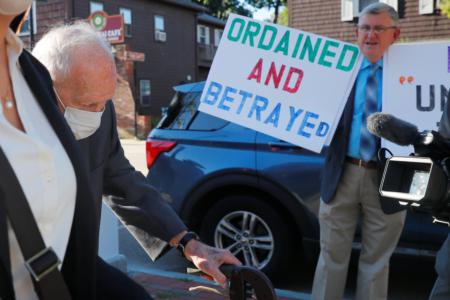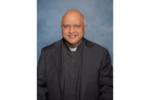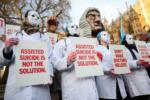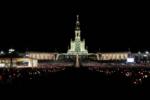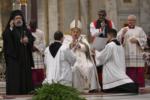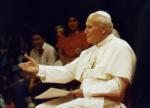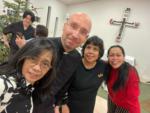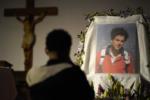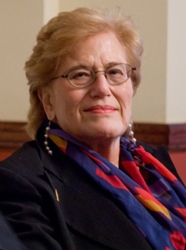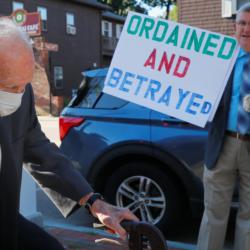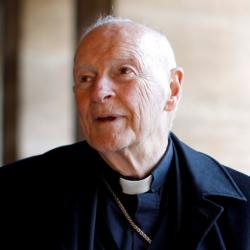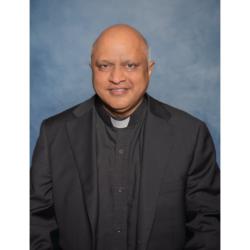Visit builds on strong local Catholic-Jewish ties
BOSTON -- During a recent visit to Boston, the American Jewish Committee’s representative to the Vatican met with Cardinal Seán P. O’Malley to suggest ways to further the good relationship between local Catholics and Jews.
Lisa Palmieri-Billig, the AJC’s representative in Rome, said the cardinal was “extremely willing” to dialogue and collaborate on future projects.
At the Cathedral of the Holy Cross on Nov. 5, a dozen Catholic and Jewish leaders gathered to dialogue. Later that evening, leaders gathered for further discussion at a private home in Wellesley.
The AJC, headquartered in New York, was established in 1906 with the mission of safeguarding the welfare of Jews in the United States, strengthening the principles of pluralism and enhancing the quality of American Jewish life. The committee operates 32 U.S. chapters and has offices in Belgium, France, Germany, India, Israel, Italy, Poland and Switzerland.
The trip to Boston was part of Palmieri-Billig’s nationwide tour for the AJC. She also traveled to Stanford, Westchester County in New York, Phoenix and Los Angeles. At each stop she talked about her work in Rome and the state of Vatican-Jewish relations. In addition, she encouraged closer contact between Catholic and Jewish communities in each area, she said.
“We have a dialogue that is both formal and informal,” she said. “It’s based on friendship.”
Palmieri-Billig told The Pilot that the Boston stop was the “highlight” of the trip, adding that it produced “wonderful discussion.”
Cardinal O’Malley reported in his blog posting of Nov. 9 that the meeting was “cordial and enjoyable.”
Father David Michael, the assistant director of ecumenical and interreligious affairs for the archdiocese, said the AJC has long been one of the archdiocese’s partners in dialogue.
Larry Lowenthal, executive director of the AJC’s Greater Boston chapter, called Father Michael a “longtime friend.”
Both men were at the meeting with the cardinal, and Lowenthal said it was an opportunity to build on an already positive relationship.
“We discussed the possibility of expanding the Catholic-Jewish dialogue here in Boston,” he said. “We think this is critically important. We have a very strong and extremely friendly relationship with the Catholic community. We want to build on that.”
The later meeting in Wellesley was a dialogue, not just between leaders of Catholics and Jews, but of members of different churches and synagogues. This type of intense, honest and friendly interaction is exactly what the AJC wants to promote, Lowenthal said.
Although there is a history of negative episodes in Jewish-Catholic relations, Palmieri-Billig spoke at the meeting about the progress made in the last decades. She talked about the papacy of Pope John XXIII, the significant advances made by Pope John Paul II and the continuation of those steps forward by Pope Benedict XVI. Both of the most recent popes lived through World War II and are sensitive to the trauma of the Holocaust, she said.
Palmieri-Billig is also the Rome correspondent for the Jerusalem Post. As a journalist, she had the opportunity to interview then-Cardinal Joseph Ratzinger in 1990 about Jews, Judaism and the Catechism of the Catholic Church, which was being drafted.
“What was important was his stressing the continuity of the Scriptures between the Hebrew Bible and the Gospels,” she said.
Pope Benedict XVI puts great value on the close interreligious relationship that Catholics and Jews have, said Palmieri-Billig. She noted that when he speaks of the history of Europe, he speaks of the continent’s Judeo-Christian roots.
The Wellesley group also discussed current issues, including Pope Benedict XVI’s apostolic letter “Summorum Pontificum” released July 7 and the implication of widening the use of the Latin Mass, specifically the prayer for the conversion of Jews at the Good Friday liturgy.
“We have been told that the Vatican will be working on it,” she said. “That’s something we hope will be resolved, and we are confident that it will be.”
